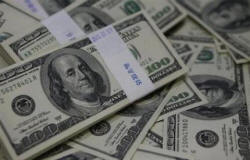|
 Dollar
slides broadly, bullish data helps euro Dollar
slides broadly, bullish data helps euro
 Send a link to a friend
Send a link to a friend
[May 06, 2014]
By Patrick Graham
LONDON (Reuters)
— The dollar slid to a seven-week low against the euro
on Tuesday, as the positive shine from U.S. jobs data last week
faded in the light of bullish European figures and a lack of faith
in the potential for U.S. interest rates to rise.
|
|
 The move drove the dollar to its lowest in more than six months
against a basket of currencies <.DXY>. Some dealers said there might
be another attempt to push the euro past $1.40 ahead of this week's
European Central Bank policy meeting. The move drove the dollar to its lowest in more than six months
against a basket of currencies <.DXY>. Some dealers said there might
be another attempt to push the euro past $1.40 ahead of this week's
European Central Bank policy meeting.
Against that is ECB officials' vocal opposition over the past month
or so to any gains past that level. The single currency gained 0.4
percent to as high as 1.39315 in morning trade in Europe.
"Everyone, I think, tried to sell the euro after U.S. payrolls on
Friday only to see it comes straight back in their faces," said
Graham Davidson, a currency trader with NAB in London.
"It feels like it (the euro) will go a bit higher. The dollar is
just weak, although I think we are all puzzling our heads as to
exactly why."
The euro was helped by strong surveys of service-sector purchasing
managers in Spain and Italy. It remains supported by flows of
capital into its southern economies, where interest rates on
government debt are still much higher than those in the United
States.

Such flows of capital, in addition to the euro zone's large trade
surplus, seem to be at the heart of the dollar's failure to make
good on predictions of a strong 2014. But there are also more doubts
in general over the Federal Reserve's willingness to follow its
reining in of emergency monetary stimulus - set to be completed in
October - with actual rises in official borrowing costs.
"Until we hear that definitively the Fed is planning a rate rise,
the euro and others will remain attractive," said Neil Mellor, a
strategist with Bank of New York Mellon in London.
The dollar was also down 0.2 percent to about 101.95 yen, within
sight of Monday's two-week low of 101.86 yen.
ECB
The other piece of the puzzle is euro zone policymakers' resistance
to more dramatic steps, just yet, to spur growth.
[to top of second column] |

The fall in inflation halted last month and PMI surveys of
service-sector purchasing managers made for bullish reading on the
prospects of improvement in the southern economies most hurt by four
years of turmoil over government debt.
Most see that as having headed off the prospect of any action from
this week's ECB meeting, much less any step towards the sort of
full-scale money-printing - "quantitative easing" - already used by
other central banks.
"Following some verbal toing and froing on the part of the ECB the
market now seems to be certain that there will be no further
momentum from that direction," analysts Dutch bank ING said in a
morning note.
BNY Mellon's Mellor said the ECB had already pointed to June's new
macroeconomic forecasts as a more likely focus for any action.
"There is the possibility of a rate cut, but would that even have
any impact on the euro? We've had rate cuts previously and they have
had no effect," said BNY Mellon's Mellor. "It's going to take a lot
to compete with QE in the United States."
(Editing by Larry King)
[© 2014 Thomson Reuters. All rights
reserved.] Copyright 2014 Reuters. All rights reserved. This material may not be published,
broadcast, rewritten or redistributed.
 |